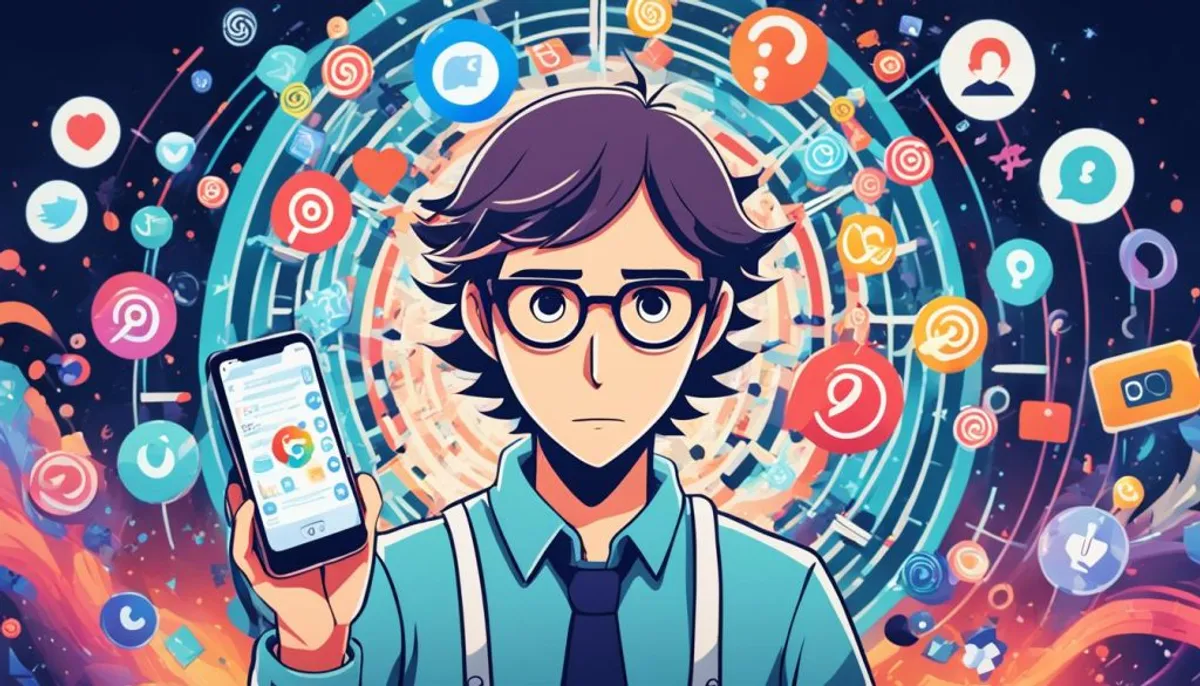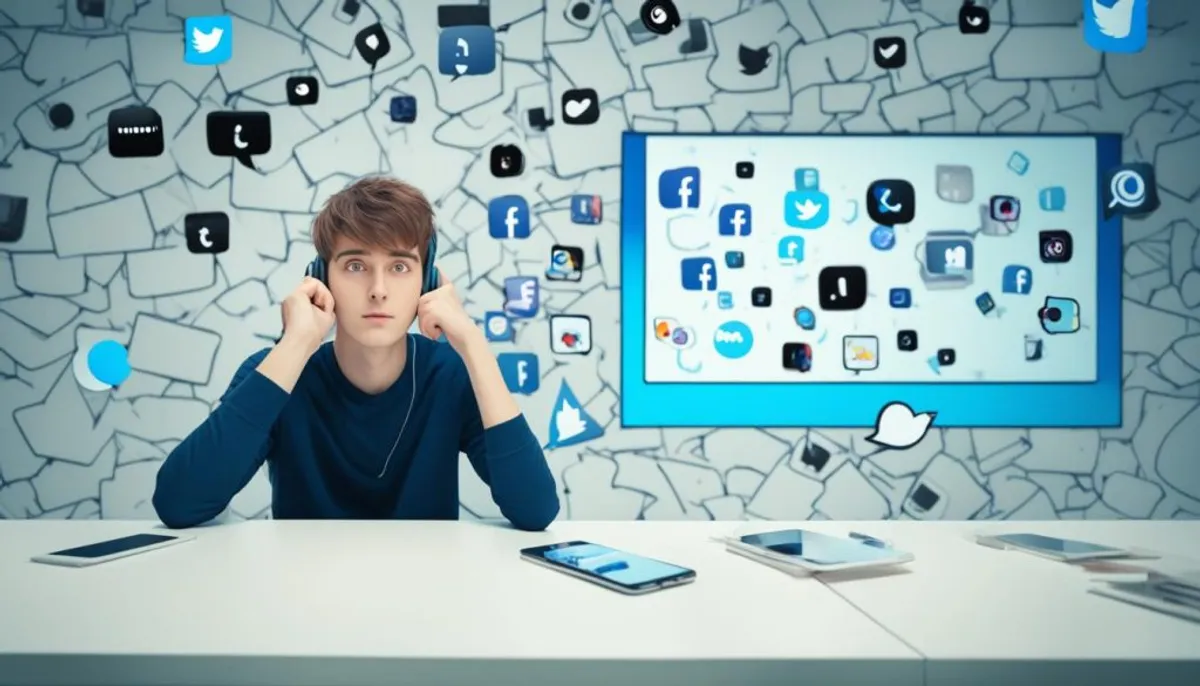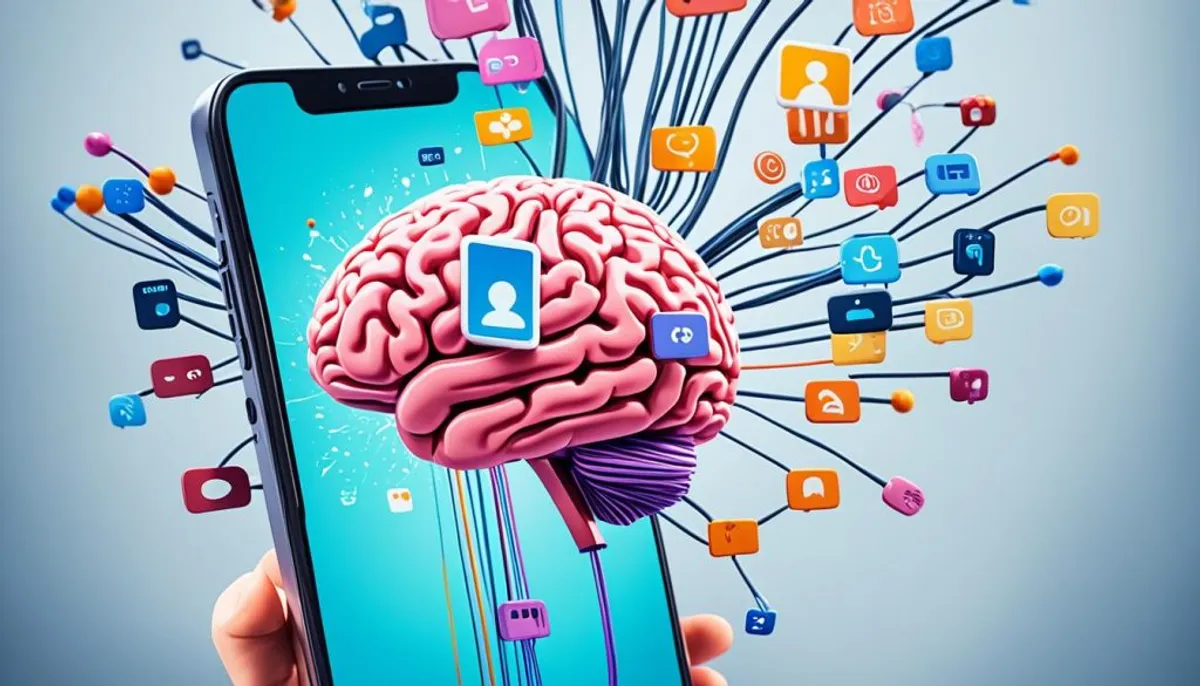Today, we’re tackling the issue of social media addiction. It’s a big deal in our world full of digital connections. Understanding how these platforms might be addictive is crucial. The addiction can affect how we feel, think, work, and interact with others.
We’re looking into what makes social media addictive. You’ll learn about the symptoms and how it can change your life. Plus, we’ll share tips on breaking free from this addiction. And how to keep a healthy balance with social media use.

Key Takeaways:
- Social media addiction is a prevalent problem in today’s digital age.
- Symptoms of social media addiction include excessive use, irritability when unable to access social media, and neglecting responsibilities and interests.
- Causes of social media addiction include societal pressures, the fear of missing out (FOMO), and the need for social validation.
- Social media addiction has a significant global impact and is linked to negative effects on mental health.
- The young generation is particularly susceptible to social media addiction and its associated consequences.
Recognizing the Symptoms of Social Media Addiction
Social media addiction is a big concern today. We need to know the symptoms to tackle it right. Look out for these key signs:
Excessive Use
Spending too much time on social sites is a main symptom. People find it hard to stop scrolling or refreshing, which can lead to issues related to comparison and self-worth.
Irritability when unable to access social media
If you can’t get on social media, feeling irritable is a common sign. Not being able to engage makes people frustrated.
Neglecting responsibilities and interests
This addiction may cause you to ignore work, relationships, or hobbies. Implementing self-care strategies is essential when social media comes first, as other parts of life suffer.
Feeling anxious without social media
Relying on social media too much can make you anxious when offline. This unease feeds the addiction, needing constant connection.
Constantly checking for notifications
Always looking for new notifications shows addiction. It’s the fear of missing out on anything happening online.
Social media algorithms and the addiction cycle
Social platforms use features and algorithms to keep you hooked. They tailor content to grab your attention, making quitting hard.
To fight social media addiction, recognizing these signs is crucial. Knowing the addiction’s patterns helps in taking control and improving wellness.
| Signs of Social Media Addiction | Percentage of Social Media Users |
|---|---|
| Excessive Use | 65% |
| Irritability when unable to access social media | 52% |
| Neglecting responsibilities and interests | 47% |
| Feeling anxious without social media | 38% |
| Constantly checking for notifications | 61% |
Recognizing social media addiction symptoms is key to tackling it. By being aware and proactive, we can find a better balance with social media, implement self-care strategies, and take back control of our lives.
Causes of Social Media Addiction
Social media addiction is on the rise in today’s digital world. It comes from many sources, such as the need to fit in and the desire for approval. People turn to social media for different reasons.
Societal Pressures: The need to meet society’s standards is a big reason behind social media addiction. Everyone wants to look perfect online for likes and comments. This desire pushes people to constantly update their profiles.
Fear of Missing Out (FOMO): FOMO makes people stuck to their screens. They don’t want to miss any event or trend. So, they keep refreshing their feeds to feel in the loop.
Need for Social Validation: Getting likes and comments online makes people feel good. They use social media to get approval and attention. This need for recognition makes social media hard to resist.
Global Connectivity and Self-Expression: Social media is a space for people to share their lives and ideas. It helps them show who they are and connect with others worldwide. Engaging in new activities is especially important for young people as they find it crucial for building their identity.
Social media addiction isn’t just a youth problem. Around 210 million people globally struggle with it. People of all ages can get hooked on social media.
Knowing why people get addicted to social media helps in finding ways to fight it. It’s key to tackling this modern-day issue.

| Statistics | Percentage |
|---|---|
| Percentage of people who use social media worldwide | 60% |
| Average daily usage time on social media platforms | 2 hours and 24 minutes |
| Percentage of internet users with signs of social media addiction | Over 40% |
| Average daily time spent on social media | 144 minutes |
The Global Impact of Social Media Use
Social media is a huge part of our lives today. It touches both individuals and groups in many ways. We’ll look at some important facts that highlight how widespread social media addiction is. We’ll also discuss its effects on mental health.
Social Media Addiction Statistics
Did you know 60% of people around the world use social media? This is a big deal, showing how common these platforms have become. With a total global population near 7.9 billion, this means about 4.7 billion people are active on social media. They use it for talking to others and creating content. Additionally, many are starting to view social media as a search engine, utilizing these platforms to discover information and connect with brands.
But it’s not just the number of users that worries us. More than 40% of those online might be hooked on social media. They spend around 144 minutes every day on these sites. This issue affects everyone, no matter their age or background.
The Impact on Mental Health
Social media’s effect on mental health is serious. A lot of research links too much social media to bad mental health results. This includes feeling more depressed, anxious, and having low self-esteem.
About 71% of people say social media addiction hurts their happiness. Constantly comparing oneself to others online, the push to look perfect on the internet, and feeling left out (FOMO) lead to feeling not good enough. These feelings make us unhappy with our real lives. To combat these issues, many are advocating for social media-free zones where individuals can disconnect and focus on their immediate surroundings.
Being addicted to social media can also cause bad sleep. People often lose sleep over scrolling through their feeds or chatting online. Not sleeping enough makes mental health problems even worse. It creates a cycle of addiction that’s hard to break.
United States, India, and China: The Leading Social Media Users
The US, India, and China are big on social media usage. Their large populations and easy internet access play a big part. These countries lead in the number of people using social media.
Just in the US, there are about 231 million social media users. India is not far behind with some 227 million users. China tops the list with 746 million users. It has the most social media users in the world.
These figures show us how popular social media is in these countries. They also tell us we need to pay more attention to social media addiction and its issues, including the sedentary behavior risks associated with prolonged use.
The Urgency for Change
“The impact of social media addiction is far-reaching and demands immediate attention. It not only affects individual well-being but also has implications for society as a whole. Addressing this issue requires a comprehensive approach encompassing awareness, education, and strategies to promote healthy digital habits.”
We need everyone – from regular people to leaders – to see how big of a problem social media addiction is. By looking at the stats and how it affects us, we can start to create a healthier online culture. This way, we ensure a better future for everyone.
The Dark Side of Social Media
Social media addiction can harm mental health by leading to anxiety and depression. It makes it hard to focus, causes irritability, and lowers productivity. The relationship between dopamine and social media is crucial, as too much scrolling and the hunt for likes can create an addiction. This affects our mental health deeply.
Another issue is how it leads to distracted driving. About 30% of people check social media while driving. This is dangerous for everyone on the road. The temptation to check notifications can cause serious accidents.
We need to fight social media addiction for our mental health and safety. By understanding its bad effects, we can build a healthier relationship with it. This can lower the addiction risks.
Now, let’s look at how social media affects teens. We’ll dive into research findings and how addiction impacts them.
Social Media and the Young Generation
Teenagers are the biggest users of social media. Research finds that 22% of teens check their accounts more than 10 times daily. Also, over 70% keep their passwords secret from parents. This shows they value their online privacy and interactions.
The effect of social media on teens is significant. Social media can change how they see themselves, with 15% altering their views based on online feedback. This can be good or bad, depending on what they hear from others.
Too much time on social media can harm the mental health of young people. They often feel less than perfect, comparing themselves to ideal lives online. This can lead to anxiety and depression. The ongoing comparison and self-worth issues can further exacerbate these feelings. Plus, the pressure to fit in online can lower their self-esteem.
The Importance of Social Media Addiction Research
Studying social media addiction in teens is key. It shows us how excessive use affects them over time. It also helps find ways to encourage healthy habits and protect their mental health.
Research into this addiction gives insight into its effects on teens’ thoughts, feelings, and actions. It helps discover why addiction happens. This can lead to methods to overcome the problem.
Implications of Social Media Addiction on Teenagers
Being addicted to social media affects teens in many ways. It harms their mental health, including mental health issues in teens, and hurts their social lives and school work. They might struggle to make real friends, feeling isolated.
For school, the addiction distracts them, causing lower grades. They spend too much time online instead of studying. This hurts their chances of doing well in school.
Research on this addiction is very important. It helps us understand its bad effects on teens, particularly in relation to adolescent mental health. By learning more, we can help them use social media in a healthier way. This supports the well-being of our young people.
The Role of Social Media Platforms
Social media platforms play a big role in our lives today. They offer many features that draw us in and keep us connected. But there’s a hidden truth. These platforms are made to be addicting. They grab our attention and make us want to come back for more.
The infinite scroll is one reason social media is addicting. We swipe through, and new content keeps coming. This endless stream feeds our curiosity. It makes it hard to put the phone down.
Notifications are another big part. They keep us coming back with pings and alerts. Each one gives us a little rush of happiness, which is closely linked to dopamine and social media. This makes us want to stay on social media more and more.
Social media also uses variable rewards. It’s like gambling where we can’t predict the rewards. Likes, comments, and shares are these rewards. They keep us coming back, hoping for more.

The addicting nature of social media isn’t an accident. Research shows it triggers the brain’s reward center. This releases dopamine, creating a pleasure similar to drugs or alcohol.
“Social media is a digital playground where the brain gets its fix of dopamine, creating an addictive cycle that keeps us hooked.” – Dr. Jane Sullivan, Neuroscientist
It’s important to understand why social media is addicting. This helps us fight the addiction and control how we use it. By knowing the addictive features, we can limit our time on screen. We can set boundaries and build a healthier social media relationship.
Overcoming Social Media Addiction
Cutting down on social media is key to beating addiction. It helps to set healthy limits and take back control of your time. Here are some tips to help you overcome social media addiction:
- Set time limits: Choose specific times for social media and stick to them. Use a timer or app to alert you when time’s up.
- Use app blockers: Get apps or browser extensions that block social media at certain times. They stop you from endless scrolling.
- Find alternative activities: Do things that make you happy outside of social media. Try new hobbies, exercise, read, or hang out with loved ones.
- Seek professional help: If you can’t do it alone and it’s serious, talk to a therapist. They offer help and extra resources for your situation.
- Turn addiction into a positive outlet: Change your social media habit into something good. Start a blog, make content, or join online groups that share your interests.
Beating social media addiction takes time and effort. By following these steps and getting support, you can take back your life. You’ll build a healthier relationship with social media.
Conclusion
Social media addiction is a big issue that affects many areas of life. It harms our mental and physical well-being, work, and how we interact with others. Knowing the signs of this addiction is the first step to deal with it.
Looking into why people get hooked on social media is key. Things like wanting to fit in or getting likes matter a lot. Yet, the design of social media sites also plays a big part in making them addictive.
To fight social media addiction, try setting limits on use or blocking the apps. Finding new hobbies, such as engaging in new activities, can also help. For those struggling more, getting help from a professional is a good idea. Keeping a healthy balance with social media use can improve life and lessen its downsides.
FAQ
Is social media addictive?
Yes, it is a big problem in today’s world.
What are the symptoms of social media addiction?
These include using it too much and getting upset when not able to use it. People also ignore other parts of their life and feel anxious without it. They are always checking for new messages or likes.
What causes social media addiction?
It’s caused by feeling you need to fit in, being afraid of missing out, and wanting likes. It’s also about connecting with others worldwide and showing who you are.
How does social media addiction impact society?
Around 210 million people globally are addicted. It hurts our mental health, makes us less productive, and harms our social skills.
What are the negative effects of social media addiction on mental health?
It’s linked to feeling anxious and sad. Too much social media can make it hard to focus, make you irritable, and less productive.
Does social media addiction affect teenagers?
Yes, teenagers are very active on social media. Over 70% keep their passwords private from parents. Too much social media use causes mental health issues in teens and young adults.
What features of social media make it addictive?
Social media uses things like endless scrolling, alerts, and unpredictable rewards. These make using social media very tempting and hard to stop.
How can someone overcome social media addiction?
To beat it, set time limits, use apps to block social media, find new hobbies, and get help if you need it. Turning it into something productive or positive can also help.
RelatedRelated articles



